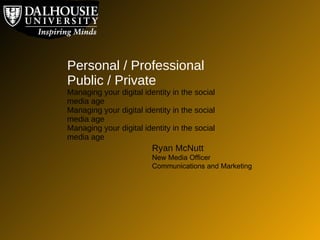Data privacy day - Ryan McNutt
- 1. Personal / Professional Public / Private Managing your digital identity in the social media age Managing your digital identity in the social media age Managing your digital identity in the social media age Ryan McNutt New Media Officer Communications and Marketing
- 2. On privacy.... ŌĆ£ People have really gotten comfortable not only sharing more information and different kinds, but more openly and with more people. That social norm is just something that has evolved over time.ŌĆØ Mark Zuckerberg, founder and CEO, Facebook
- 3. On privacy.... ŌĆ£ While you may reel at the privacy implications, IŌĆÖd wager that the high price of not capturing and sharing every moment of our lives will soon dwarf the cost to our privacy.ŌĆØ Peter Cashmore, founder and CEO, Mashable
- 4. On privacy.... ŌĆ£ No matter how many times a privileged straight white male technology executive pronounces the death of privacy, Privacy Is Not Dead . People of all ages care about privacy. And they care just as much about privacy online as they do privacy offline. But what privacy means may not be what you think.ŌĆØ Danah Boyd, social media researcher, Microsoft; fellow, Harvard University
- 6. What do people think about privacy online? 36% of adults ŌĆ£very concernedŌĆØ about privacy on social networking sites (up from 30% in 2009) Generation gap: 50% of 54-64 year olds feel that way, but only 30% of 18-29 year olds. 92% say companies should get permission before gathering information from you. 70% feel that being tracked online is a violation of their privacy. ...but 47% confessed that they donŌĆÖt read privacy settings on the sites they visit. Sources: Forrester Research, ConsumerAction.org
- 9. The consequences 8% of companies reported dismissing an employee for behaviour on social media sites. 9% of social network users have experienced some sort of abuse - malware, scams, identity theft, harassment. 43% of social networking teens have been contacted by someone they didnŌĆÖt know 9% of social network users have experienced some sort of abuse - malware, scams, identity theft, harassment. Sources: Proofpoint; Pew Research Centre, Consumer Reports
- 11. 7 things to stop doing on Facebook (Consumer Reports) Using a weak password Leaving your full birthdate in your profile Posting your childŌĆÖs name in a caption Overlooking privacy controls Mentioning youŌĆÖll be away from home Letting search engines find you Permitting youngsters to use Facebook unsupervised And one of my own...be careful with applications.
- 13. But more broadly... Survey your digital footprint Stop and think ŌĆ£whyŌĆØ youŌĆÖre sharing what youŌĆÖre sharing Consider cyberspace as forever Be careful with location Consider the identity you want to actively BUILD
- 14. On identity... ŌĆ£ Everything you do now ends up in your permanent record. The best plan is to overload Google with a long tail of good stuff and to act as if youŌĆÖre always on Candid Camera, because you are.ŌĆØ Seth Godin, author, marketer
- 16. ŌĆ£ Often, privacy isnŌĆÖt about hiding; itŌĆÖs about creating space to open upŌĆØ
- 17. Ryan McNutt [email_address] @ryanmcnutt Linkedin.com/in/ryanmcnutt mcnutt.wordpress.com ryanmcnutt.tumblr.com facebook.com/ryanmcnutt THE END Presentation prep soundtrack ...questions? Dismemberment Plan Emergency and I Kanye West My Beautiful Dark Twisted Fantasy Young Galaxy Shapeshifting Imaginary Cities Temporary Resident
















![Ryan McNutt [email_address] @ryanmcnutt Linkedin.com/in/ryanmcnutt mcnutt.wordpress.com ryanmcnutt.tumblr.com facebook.com/ryanmcnutt THE END Presentation prep soundtrack ...questions? Dismemberment Plan Emergency and I Kanye West My Beautiful Dark Twisted Fantasy Young Galaxy Shapeshifting Imaginary Cities Temporary Resident](https://image.slidesharecdn.com/dataprivacyday-110303131400-phpapp01/85/Data-privacy-day-Ryan-McNutt-17-320.jpg)